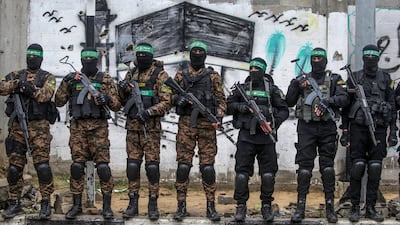The Gaza ceasefire that came into effect on Friday is a lesson for Hezbollah not to surrender its arsenal, an official of the Lebanese militant group told The National as it faces unprecedented pressure to give up its weapons.
“When we look at what happened in Gaza and its reflection on Lebanon, any rational observer would see that maintaining our weapons remains a vital source of strength for the Lebanese in reclaiming their rights,” Youssef Al Zein, the head of Hezbollah’s media office, told The National.
Mr Al Zein also warned that Gaza could face the same scenario as Lebanon, where Israel continues to carry out near-daily strikes despite a ceasefire, if the US, Arab and Turkish mediators fail to uphold guarantees that Israel will not resume the war.
The Israeli Prime Minister Benjamin Netanyahu has maintained a hardline stance throughout the Gaza war, touting ideas such as the forcible relocation of Palestinians to neighbouring countries and declaring his intention to maintain full military control over the strip until Hamas is annihilated.
As Israel intensified its assault on the devastated enclave, the UN condemned what it described as Israel’s “clear and consistent intent” to establish “permanent control over the Gaza Strip,” as its forces systematically demolished civilian infrastructure and expanded areas under their control.
However, according to Mr Al Zein, the Israeli leader was forced to make concessions under the current Trump ceasefire plan, which rules out any forced population displacement and calls for Israel’s withdrawal from most of the strip. Mr Al Zein argued that Hamas’s weapons had given it leverage in the deal – a lesson, he said, that Hezbollah should not give up its own arsenal.
“Gaza’s armed resistance ultimately forced Israel to back down and accept these terms. Lebanon should draw strength from that experience, which showed that armed resistance can lead to what would have been unimaginable otherwise,” he said.

Hezbollah is an ally of Hamas, and both are part of the Iran-led “Axis of Resistance”, a network formed to counter Israeli and US influence in the region. Hezbollah fired rockets towards Israel on October 8, 2023, a day after the start of the Gaza war, in solidarity with its ally, beginning 14 months of conflict that culminated in a deadly two-month Israeli air campaign that ended with a shaky, US-brokered ceasefire in November last year.
Under the agreement, Israel was to halt its strikes on Lebanon and withdraw its troops from southern Lebanon, while Hezbollah was to begin disarming and removing its fighters starting from south of the Litani River.
But despite unprecedented Lebanese efforts to curb Hezbollah’s weapons, Israel has continued daily ceasefire violations, striking what it says are Hezbollah sites and members, and killing more than 100 civilians so far.
A Lebanon scenario in Gaza
Mr Al Zein warned that Gaza could end up in a situation similar to Lebanon’s if the mediators fail to ensure that Israel honours its commitments.
Mr Al Zein accused the mediators who brokered the Lebanon deal, namely the US and France, of failing to hold Israel accountable for thousands of ceasefire violations. “If the mediator states of the Gaza ceasefire don’t uphold their guarantees, the situation ends up just like what’s happening with Lebanon now,” Mr Al Zein said.
Hamas has received personal guarantees from US President Donald Trump that he will not allow Israel to resume the war, Axios reported. The pledge reportedly convinced the group to sign the deal and agree to release the remaining Israeli hostages in Gaza, giving up its most significant leverage with Israel.
But uncertainty remains about whether the reported guarantees will hold and lead to a lasting peace. The deal agreed between Hamas and Israel is only the first phase of Trump’s peace plan and includes a cessation of hostilities by both sides, the exchange of Israeli hostages for Palestinian prisoners and detainees and a partial withdrawal of Israeli troops from positions in the enclave.
But many thorny issues remain, including Hamas’s arsenal, which the group has long refused to give up despite that being a central Israeli demand, and a full Israeli withdrawal from the strip. Some fear the truce could collapse, leading Israel to resume hostilities as it did in March this year, ending the previous ceasefire.

No disarmament under occupation
Mr Al Zein said Hezbollah was ready to discuss disarmament as part of a “national security strategy without foreign interference”, when Israel abides by the ceasefire.
“We say that these weapons were created to serve the resistance. As long as the occupation exists, these weapons have a function. When the occupation ends, that function ends,” he said.
But Israel should first stop its attacks, withdraw its troops from five positions inside Lebanon, and release at least 15 Lebanese held in Israel, including seven civilians, he said. He added that there should be guarantees of reconstruction in the south amid growing concerns that Israel is seeking to establish a buffer zone along the border.
Israel razed several Lebanese border towns after the ceasefire before pulling its forces out, and attacked rebuilding efforts, preventing the return of tens of thousands of residents. “You cannot, while occupation continues and the victim is still under attack, tell the victim to hand over their weapon – that would mean you are giving Israel the chance to continue its aggression and its occupation,” Mr Al Zein said.
Many observers say the Axis of Resistance, including Hamas and Hezbollah, once Iran’s most prized assets, has been considerably weakened since the Gaza war began. Mr Al Zein acknowledged that Hezbollah paid a “heavy price”, with “many martyrs, and great losses”.
“But we’re still strong,” he said. “If we were truly weak, Israel wouldn’t be seeking to force our disarmament.”


